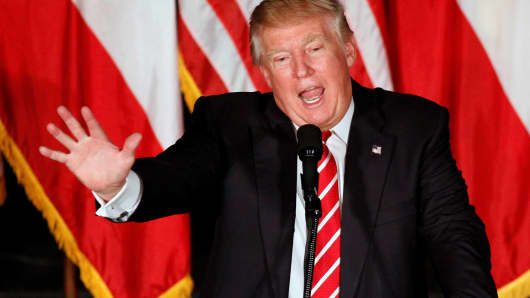Donald Trump doubled down on his divisive immigration rhetoric this week following the massacre of 49 people at a gay nightclub in Orlando, Florida. If elected, he may not even need lawmakers’ help to act on some proposals.
The presumptive Republican presidential nominee first proposed a temporary ban on Muslims entering the country in the aftermath of the Dec. 2 terrorist attack in San Bernardino, California. It was a constitutionally questionable proposal that drew criticism from both sides of the aisle. In a speech this week, he pledged to restrict immigration from areas of the world with terrorism ties.
If elected, Trump could likely limit immigration from certain parts of the world through executive action, if not approval from a GOP-controlled Congress, experts said. But his proposals — particularly any based on religion — will face significant resistance and could prove onerous in practice.
“I think he could (limit immigration from certain areas) with executive action. … But it becomes very, very hard to do on an operational level. And its yield is extremely doubtful,” said Muzaffar Chishti, director of the nonpartisan Migration Policy Institute at New York University School of Law.
Early Sunday, 29-year-old Aghan-American Omar Mateen opened fire at Orlando’s Pulse nightclub, killing 49 people and injuring dozens before dying in a shootout with police. He was armed with an assault-style rifle and pistol and had pledged loyalty to the so-called Islamic State terror group. U.S. officials say he was self-radicalized.
Despite Mateen’s American birth, Trump seized on the attack as another example of a failed U.S. immigration system. His initial call for a “complete shutdown of Muslims entering the United States until our country’s representatives can figure out what the hell is going on” followed the December terror attack in San Bernardino.
This week, Trump modified the proposal slightly, saying he wanted to “suspend immigration from areas of the world where there is a proven history of terrorism against the United States, Europe or our allies until we fully understand how to end these threats.” He believes he would have the authority to implement the measures, if elected.
“The immigration laws of the United States give the president powers to suspend entry into the country of any class of persons,” Trump said Monday.
According to U.S. code on immigration, the president does hold the authority to “suspend the entry of all aliens or any class of aliens” if the group’s entry “would be detrimental to the interests of the United States.” That can extend for as long as the president deems necessary.
Trump does have some precedent for an executive order on immigration. President Barack Obama has used that power broadly, and issued an order to give some protections to millions of people who entered the U.S. illegally as children or have children who are citizens. The Supreme Court is hearing a challenge to the action.
Still, Trump’s immigration moves would likely face court challenges, particularly if they include religious restrictions, said Mark Kennedy, director of George Washington University’s graduate school of political management.
“It would be hard to imagine how picking out a specific religion and excluding them would be constitutional,” he said. “There is the ability to do an executive order, but it still needs to be constitutional.”
Kennedy added, though, that Trump could possibly get congressional support for a “security-focused approach” that centers on a country’s government and terror presence rather than immigrants’ religion.
GOP leaders seem unlikely to support restrictions based on religion. House Speaker Paul Ryan, the top elected Republican, said Tuesday a Muslim ban is not in the country’s best interests.
“I do not think it is reflective of our principles, not just as a party but as a country,” Ryan said. “And I think the smarter way to go in all respects is to have a security test, and not a religious test.”
President Barack Obama took criticism of Trump’s proposals a step further, contending they would strengthen terror groups and make the United States less safe.
Both Kennedy and the Migration Policy Institute’s Chishti see issues with Trump’s latest proposal. First of all, Mateen was born in New York and did not immigrate to the U.S.
“What would it do? He was born in New York with access to lethal weapons. None of that would have been prevented,” Chishti said.
He also said choosing the countries or areas to bar is “difficult on operational terms.” Setting a term like the presence of ISIS, for example, could be open to broad interpretation.
Chishti also warned about the possible breach of civil liberties. He highlighted detentions and searches of certain immigrants after the Sept. 11, 2001, attacks, which prompted years-long legal action against Justice Department officials.
